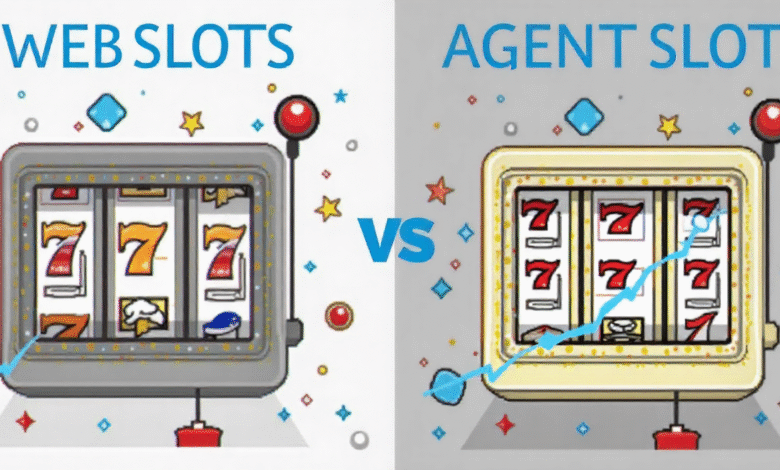Direct Web Slots vs. Agent Slots – Key Differences Explained

Slot gaming has expanded far beyond traditional casinos, with countless players turning to online platforms for accessibility and variety. But not all online slot services operate the same way. Players today often encounter two main models: direct web slots and agent slots. Each has unique characteristics that influence convenience, trust, and overall satisfaction.
Understanding these models is critical for anyone who wants to maximize entertainment while minimizing risks. To truly appreciate the differences, readers must first understand what each type of slot service means.
Understanding Direct Web Slots
Direct web slots refer to platforms where players access games directly from the official provider or a licensed operator, without intermediaries. In this model, transactions and gameplay are managed transparently by the platform itself.
Defining Features of Direct Web Slots:
- Direct Access: Players connect to the provider’s system without going through an agent.
- Account Ownership: Registration and accounts are fully under the platform’s control.
- Transparency: Payouts, bonuses, and terms are clearly displayed.
- Faster Processing: Deposits and withdrawals are often instant or completed within short timeframes.
- Licensing and Security: Direct platforms are more likely to hold licenses from recognized authorities.
These characteristics create a streamlined experience that contrasts sharply with agent-based systems.
What Are Agent Slots?
Agent slots operate through third-party intermediaries. Instead of dealing directly with the main platform, players register accounts or make transactions through an agent. The agent manages deposits, withdrawals, and sometimes even game access.
Defining Features of Agent Slots:
- Intermediary System: Agents act as a middle layer between player and platform.
- Manual Transactions: Deposits and withdrawals may require contacting the agent.
- Variable Transparency: Rules, bonuses, and fees depend heavily on the agent’s policies.
- Regional Popularity: Agent models are common in markets where direct access is limited.
While agent slots can provide access where direct platforms are unavailable, the lack of transparency often creates challenges. With both models defined, comparisons become clearer.
Accessibility and User Experience
Accessibility is often the first factor players consider.
- Direct Web Slots: Offer simple registration, self-service account management, and fast navigation. Players can log in anytime, deposit funds instantly, and start playing without delay.
- Agent Slots: Require reliance on the agent for setup and transactions. While this can provide a personal touch, it also slows the process and reduces independence.
In terms of user experience, direct slots generally deliver smoother, faster, and more reliable gameplay. This accessibility advantage ties directly into questions of trust and security.
Security and Trust Factors
Security is where differences between the two models become most pronounced.
- Direct Web Slots: Licensed providers must follow regulatory standards. Random Number Generators are audited, and financial transactions are encrypted. Transparency reduces fraud risk.
- Agent Slots: Trust largely depends on the agent’s integrity. Without oversight, players risk delayed withdrawals, hidden fees, or even scams.
Evidence from industry reports consistently shows that platforms with licensing and clear systems inspire greater long-term confidence. Security, however, also extends to how transactions are handled.
Payment Systems and Transaction Transparency
Payments are the backbone of slot gaming, and the way they’re processed greatly impacts convenience and trust.
- Direct Web Slots: Support modern payment methods like e-wallets, banking apps, and instant transfers. Players can track every transaction within their accounts.
- Agent Slots: Transactions often go through manual transfers to the agent. This creates delays, increases the risk of error, and introduces uncertainty about whether funds will arrive.
Transparent payments reduce anxiety and boost confidence, while opaque systems create stress. These differences influence player psychology just as much as technical factors.
Player Psychology in Direct vs. Agent Slots
Human psychology plays a powerful role in slot gaming, shaping both satisfaction and risk tolerance.
- Control: Direct web slots give players a sense of control over accounts and funds, reducing stress.
- Risk Perception: Agent slots can feel uncertain because players must trust a third party, which often increases anxiety.
- Confidence: Transparent systems encourage relaxation and enjoyment, while opaque systems create tension.
Emotional Responses to Transparency
When systems are clear and trustworthy, players feel more secure and are less likely to overthink. In contrast, a lack of transparency—common in agent models—creates uncertainty that heightens frustration, especially during withdrawals.
These psychological effects influence not just short-term experiences but also long-term loyalty to a platform.
Advantages of Direct Web Slots
Direct web slots come with several strong advantages:
- Faster Deposits and Withdrawals – Automated systems eliminate delays.
- Transparent Payouts – Players can verify winnings and rules directly.
- Regulatory Oversight – Licensing ensures fairness and reliability.
- Modern Payment Options – Support for digital wallets and mobile banking.
- Better Security – Encryption and audits safeguard personal and financial data.
- Greater Independence – No reliance on a middleman for account management.
These strengths highlight why direct web slots are increasingly preferred. However, to remain balanced, it’s important to address the drawbacks of agent slots.
Drawbacks of Agent Slots
Agent slots, while providing access, often come with notable downsides:
- Transaction Delays: Manual handling slows deposits and withdrawals.
- Lack of Transparency: Rules and fees may vary by agent, leaving players uncertain.
- Inconsistent Security: Protection depends on the individual agent’s reliability.
- Higher Risk of Fraud: Without oversight, scams and withheld funds are more common.
- Reduced Independence: Players must depend on the agent for every transaction.
These drawbacks underline why reliable platforms matter when choosing where to play.
Reliable Platforms for Slot Play
Choosing the right platform is essential for safety and enjoyment. Reliable slot platforms share common traits:
- Official Licensing from trusted gaming authorities.
- Clear Payment Policies with transparent timelines.
- Responsible Play Features like deposit limits and time reminders.
- Secure Technology with SSL encryption and verified RNG systems.
Exploring Trusted Options
- ยูฟ่าเบท 747 – Readers can follow football and entertainment services here, which also provide slot and casino access.
- คาสิโนออนไลน์ สด – Those seeking immersive experiences can explore this platform, offering real-time interactive play.
These examples highlight how safe, transparent platforms enhance the overall experience compared to less reliable agent systems.
Conclusion – Choosing Wisely Between Direct and Agent Slots
Direct web slots and agent slots represent two distinct models of online gaming. Direct slots offer speed, transparency, stronger security, and modern payment systems. Agent slots, while still used in some regions, carry risks of delays, opacity, and trust issues.
Across definitions, accessibility, security, payments, psychology, and pros and cons, one conclusion stands clear: players benefit most from choosing reliable, licensed platforms. While agent slots may provide entry points in limited markets, direct web slots remain the safer, more rewarding option for long-term play.
The smart choice is to prioritize safety and transparency—because in slot gaming, true enjoyment comes not just from spinning reels but from knowing your platform can be trusted.




